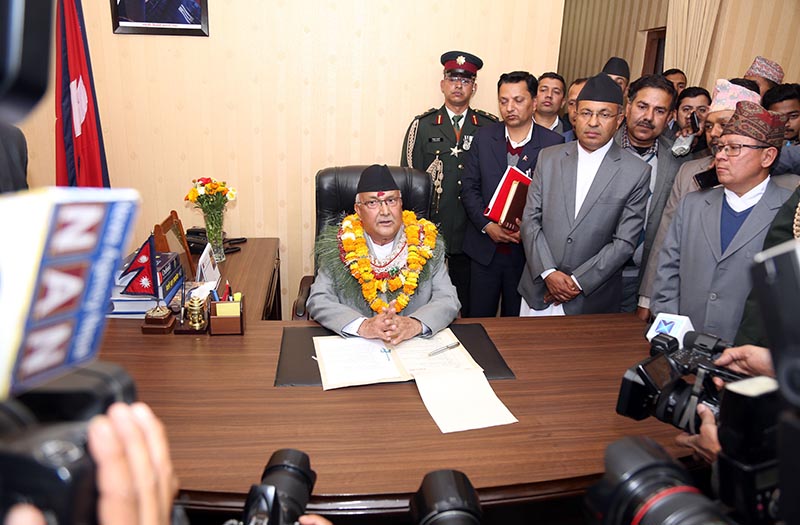Strong government, weak governance
Kathmandu, February 14
Prime Minister KP Sharma Oli has completed one year in office, becoming the first PM in almost three-and-a-half years to retain the post for at least a year. This in itself is an achievement in Nepal, which has seen 25 prime ministers, excluding former king Gyanendra, in almost 29 years.
Oli had assumed office on the planks of improving people’s livelihood, sustainable development, prosperity and good governance. These were tall promises in a country where sweet-talking politicians often misled people. Yet many gave him the benefit of the doubt. But those aware of political undercurrents were sceptical as he was the first PM under the new federal set-up, and one of his primary responsibilities was to institutionalise federalism as per the spirit of the constitution.
Federalism is unchartered territory for Nepali politicians and bureaucrats. “In a new system, governments everywhere tend to stumble because almost everything, including laws and institutions, has to be built from scratch,” said Province 3 Policy and Planning Commission Vice-chairperson and an expert on federalism, Khim Lal Devkota. This vacuum encourages everyone to push their ideas, creating differences, decelerating the decision-making process.
Yet many were hopeful about Oli steering his government smoothly because he had the support of almost two-thirds of federal lawmakers, six out of seven provincial governments, and 400 out of 753 mayors or chairpersons of local levels.
“This super majority, however, has turned out to be a bane, as it has provoked Oli to see himself as invincible and made him think he is entitled to do whatever pleases him,” said Prof Lok Raj Baral, a political analyst. So, instead of building laws and institutions needed to sustain federalism, Oli’s government has started to centralise power.
Take the instance of the Federal Civil Servant Bill, which has proposed to give the authority of appointing provincial chief secretaries, secretaries of provincial ministries and chief administrative officials of local governments to the federal government. The Nepal Police and Provincial Police Bill is another legislative document that has tried to centralise power.
It says provincial and district police officers must act as per the instruction of chief district officers appointed by the federal government, making CDOs more powerful than chief ministers. What’s more, the federal government, which is yet to hand over many infrastructure projects to provinces and local levels, has clawed back projects that had already been transferred to sub-national governments as per the policy of decentralisation.
These acts have not only riled provincial chief ministers and mayors of municipalities but ruling Nepal Communist Party Co-chairperson Pushpa Kamal Dahal, who publicly denounced attempts to weaken federalism.
Failure to avoid the temptation of majoritarianism is unbecoming of an office, which was supposed to transform the central government into an oversight agency and devolve power to provinces and local levels to enhance service delivery and bring people at the grassroots closer to the government.
“The federal government’s domination should come down. This is our humble request,” Chief Minister of Karnali Province Mahendra Bahadur Shahi said. “It is vital to be clear-headed about what should be done to strengthen federalism because a weak foundation will invite more problems in the future.”
If this continues, Nepal will maintain the facade of federal democracy through periodic polls, but without proper institutions. This will ultimately hit economic growth as innovation and entrepreneurship which are required for job creation, can only flourish in the rules-based system backed by strong institutions.
This has worried the private sector. “There is no predictable policy regime even after a year of government formation. So, it is natural for them to become concerned,” former finance minister and senior Nepali Congress leader Mahesh Acharya said.
Against this backdrop, the government is hosting Investment Summit to court foreign investors. The government has acknowledged the need for foreign investment because domestic resources are not adequate to accelerate economic growth. But will foreign investors trust this government, which has still not been able to table the Foreign Investment and Technology Transfer Bill, finalised by the previous government, in the Parliament?
Instead of addressing these problems, ministers are making populist statements as in the past when governments used to change frequently.
Recently Deputy PM and Defence Minister Ishwar Pokhrel said the government was committed to providing Rs 5,000 monthly allowance to the elderly in a stark reminder of distributive tactic used by the erstwhile CPN-UML to woo voters. While he talked about giving continuity to politically-motivated runaway spending as in the past, he did not utter a word about expediting construction of crucial projects, such as Nijgad International Airport, Melamchi Drinking Water Project, Kathmandu-Tarai Expressway, Mid-hill Highway and the 456MW Upper Tamakoshi Hydropower Project.
Many are surprised the government is not taking calculative risks to rapidly build mega projects despite having the fiscal elbow room because of its lower debt-servicing obligation – currently at less than 30 per cent of the gross domestic product. If initiatives are not taken on this front, the country will continue to observe monsoon-cum-agriculture-led low-quality growth, with productivity remaining stagnant or falling downwards.
Other areas where govt has failed
- The government has not been able to pin down perpetrators who raped and killed 13-year-old Nirmala Panta more than six months after the incident, raising questions over its ability to swiftly deliver justice
- Corruption is rampant in government offices. Nepal fell two notches in the Transparency International’s Corruption Perceptions Index to rank 124 out of 180 countries
- Nepal has also slipped five places in the latest global ease of doing business index to land at 110th position, indicating the country is not an ideal place for private investors
- Attempts to reform health education sector have been thwarted, as the ruling party bulldozed the National Medical Education Bill through the Parliament despite attempts to change some of the provisions that could lead to production of unqualified medical professionals
- The central bank is sliding as it has started doing government’s bidding
READ ALSO:






